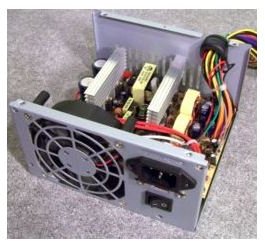Understanding Power Supplies and Calculating Which PSU You Need for PC Gaming
Electricity and You
It’s that time again, for another edition of “Building the Perfect Gamer PC”. Today we’ll be going in-depth to talk about the power supply, the piece of equipment most vital to keeping your rig functioning.
You’ll recall my analogy from Part 7 (The Processor) about the processor being the brain of the computer and the power supply being the heart. Aside from the fact that the power supply doesn’t physically pump anything, the electricity it provides could be seen as analogous to the nutrients provided to the body by the bloodstream. In that manner, it is important to note a couple of things here about your computer’s vital systems. Even though we talk about the processor and the power supply as the two most vital systems in the computer, should you lose function from your HDD or your video card, your computer will also be “broken” and in need of quick repair to get back on its feet.
All that in mind - what exactly is a power supply? Surely there’s more to it than just the fact that it’s a heavy metal box you hang from the back of your computer case to provide power to the bits and pieces of the computer? As a matter of fact, a power supply is actually a simple piece of electrical equipment. In order to better understand what it is that the power supply does, let’s first look at AC vs. DC electricity.
More than 100 years ago, there were two very famous inventors and scientists you’ve undoubtedly heard of - Nikola Tesla and Thomas Edison. Edison was the first one to discover direct current or DC power, and Tesla was the first one to practically apply alternating current, or AC power. Without getting highly technical about the physics and engineering part of the matter, the important difference between the two is that DC power is used for short-range, low-voltage necessities (like the components in the computer) and AC power is used to efficiently transmit high-voltage electricity across huge distances (this is the reason there isn’t a power plant near your house).
In any case, what happens is that the electrical company you pay every month pumps AC power into your home at around 120V (this is the amount of voltage you have running inside your electrical plugs). However, since that voltage is usually too high to be used practically in things like your electronics, there needs to be a power supply to switch the AC to DC and effectively power your equipment. Now we get to what the computer’s power supply actually does.
The power supply inside your computer is currently switching the 120 V coming into it by the main power lines of your house into much lower voltage so that the processor and all the other equipment can have power without overloading. So what do you find inside the power supply’s metal casing? A bevy of diodes, transformers and the like - all being used to achieve a rectifier effect in order to switch the electricity coming in from AC to DC. The process of doing so requires that a lot of heat be expended as a by-product, and so, the power supply also uses its own conversion system to power the huge fan found in the back of where the electrical plug goes in. Heat sinks are also rather commonly used, and with technology getting increasingly “greener”, these pieces of equipment, along with the power supply unit (PSU) itself draw in a lot less power than they did in the early days of computing.
Now that you have the basic idea behind what a power supply does, let’s get to the important parts - what to consider buying for your gaming rig. First of all, PSUs are all rated (independently by the developing company) based on Wattage. Which brings us to another important consideration - recall from physics class that watts are a measure of energy used, whereas joules are a measure of just energy. Therefore, when we say that a PSU has a 1000W power rating, that means that it uses 1000W of power in your equipment.
For the PC gamer, it’s important to never buy a power supply that is under 400W. The amount of power your computer is capable of outputting is important, especially when you consider the amount of component pieces you’ll have hooked up to it. Therefore, I highly recommend that you buy somewhere in the vicinity of 500 to 600W. That way, you can be sure that all your components will be adequately powered.
Next time, I’ll review the top 5 power supplies in order - and as usual, the one that will give you the most bang for your buck and the budget power supply. All this and more in Part 11.
PSU
This post is part of the series: Building the Perfect Gamer PC
Articles that will help you build the perfect gaming rig!
- Understanding and Choosing Video Cards and Components
- What to Look and Listen for in a Sound Card
- Review of the Best Sound Cards
- Choosing the Right Speakers for PC Gaming
- The Best Speakers for Computer Gaming
- The Basics Behind a Computer Processor
- The Best Computer Processors for PC Gaming
- What a Hard Drive Is and How it Can Help Your PC Gaming Machine
- How Power Supplies Keep Your Gaming PC Up and Running
- The Top Power Supplies for PC Gaming Computers
- Differences Between CRT and LCD Monitors for PC Gaming
- Top Monitor Choices for PC Gaming
- Why the Right Mouse Matters for PC Gaming
- Reviewing the Field of Mice for PC Gaming
- Finding the Right Keyboard for PC Gaming
- Tips to Keep in Mind When Building a Gaming PC
